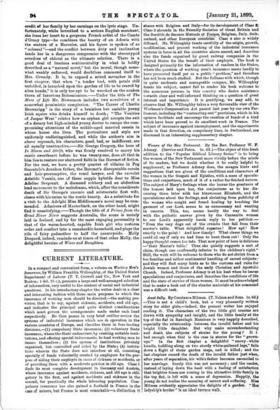CURRENT LITERATURE.
In a compact and convenient form, a volume on Working Men's Insurance, by William Franklin Willoughby, of the United States Department of Labour (T. Y. Crowell and Co., New York and Boston ; 1 dol. 73 c.), presents a large and well-arranged selection of information, very useful to the student of social and industrial questions. In his introductory chapter the writer deals in a clear and interesting fashion with three main purposes to which the insurance of working men should be directed,—the making pro- vision, that is to say, against sickness, accidents, and old age; and indicates the principal and quite distinct considerations which must govern the arrangements made under each head respectively. He then passes in very brief outline review the systems of industrial insurance which are in operation in the various countries of Europe, and classifies them in four leading divisions,—(1) compulsory State insurance ; (2) voluntary State insurance, where the State endeavours. by creating suitable insti- tutions, and offering special inducements, to lead working men to insure themselves ; (3) the system of institutions privately organised, but controlled and aided by the State ; (4) institu- tions wherein the State does not interfere at all, consisting specially of funds voluntarily created by employers for the pur- pose of aiding their employes in cases of sickness or accidents, or of providing them with a moderate pension in old age. Class 1 finds its most complete development in Germany and Austria, whore insurance against accidents, sickness, and old age is obli- gatory in the first, and against accidents and sickness in the second, for practically the whole labouring population. Com- pulsory insurance has also gained a foothold in France in the case of miners, but France is most remarkable—a distinction it shares with Belgium and Italy—for its development of Class 2s Class 3 abounds in the Friendly Societies of Great Britain and the Societes de Secours Mutuels of Fratre, Belgium, Italy, Swit- zerland, and other European countries. Class 4 also is widely diffused. Mr. Willoughby treats carefully of the origin, growth, modification, and present working of the industrial insurance systems in force in all the countries above named, and describes also the funds organised by great railway companies in the United States for the benefit of their employes. The book is designed primarily for the information of readers in the States, where the question of working men's insurance seems hardly to have presented itself yet as a public " problem," and therefore has not been much studied. But the fullness with which, though in quite moderate and manageable compass, Mr. Willoughby treats his subject, cannot fail to render his book welcome to the numerous persons in this country who desire assistance towards clear and well-informed thinking on a question of great interest and importance. It is gratifying, we may add, to observe that Mr. Willoughby takes a very favourable view of the Workmen's Compensation Act passed last year by our own Par- liament, including the " contracting-out " provisions, which in his opinion facilitate and encourage the creation of funds of a kind which have been proved to do excellent work in France. The subject of insurance against unemployment, and the experiments made in that direction, on compulsory lines, in Switzerland, are discussed in an interesting supplementary chapter.


































 Previous page
Previous page